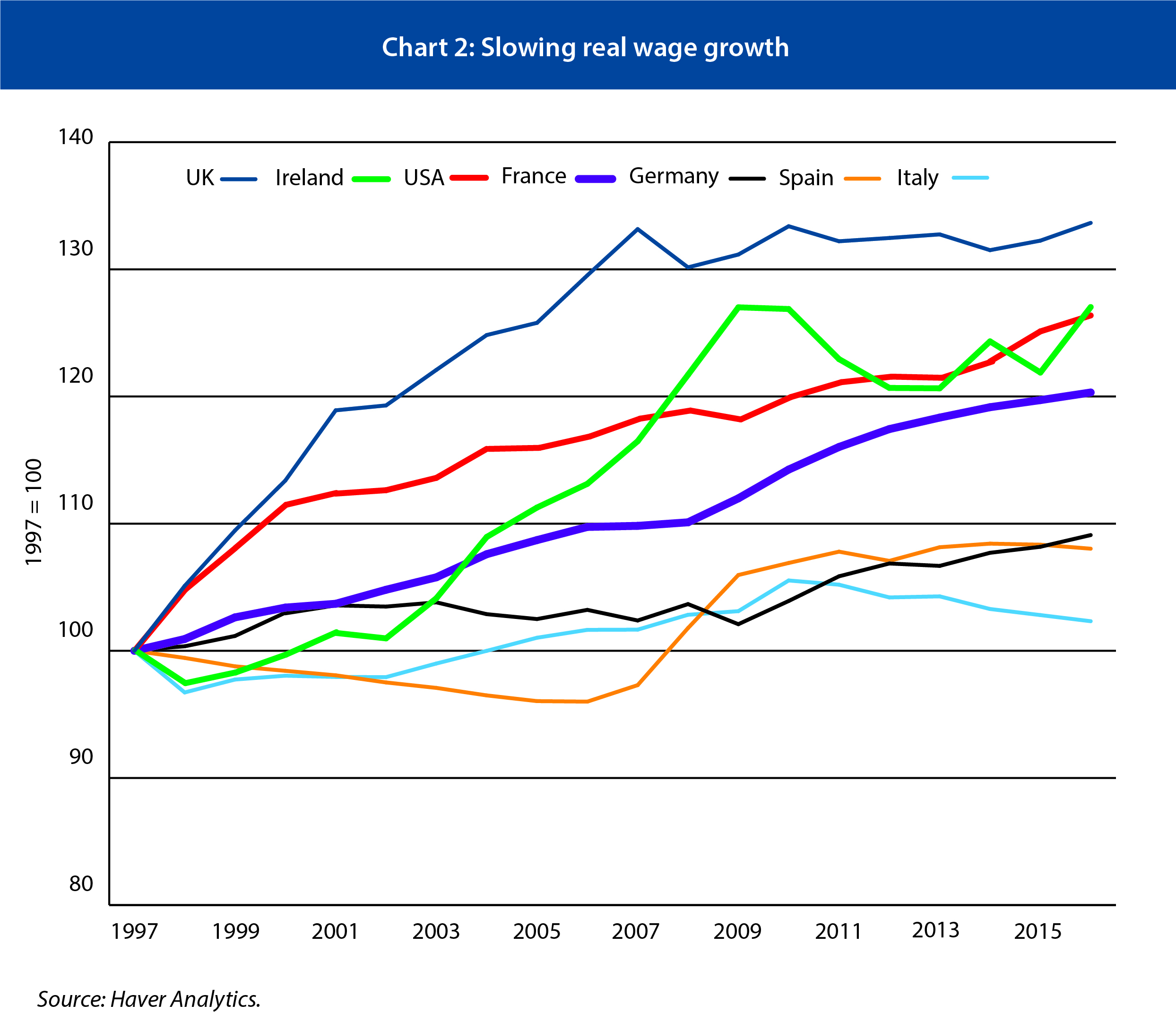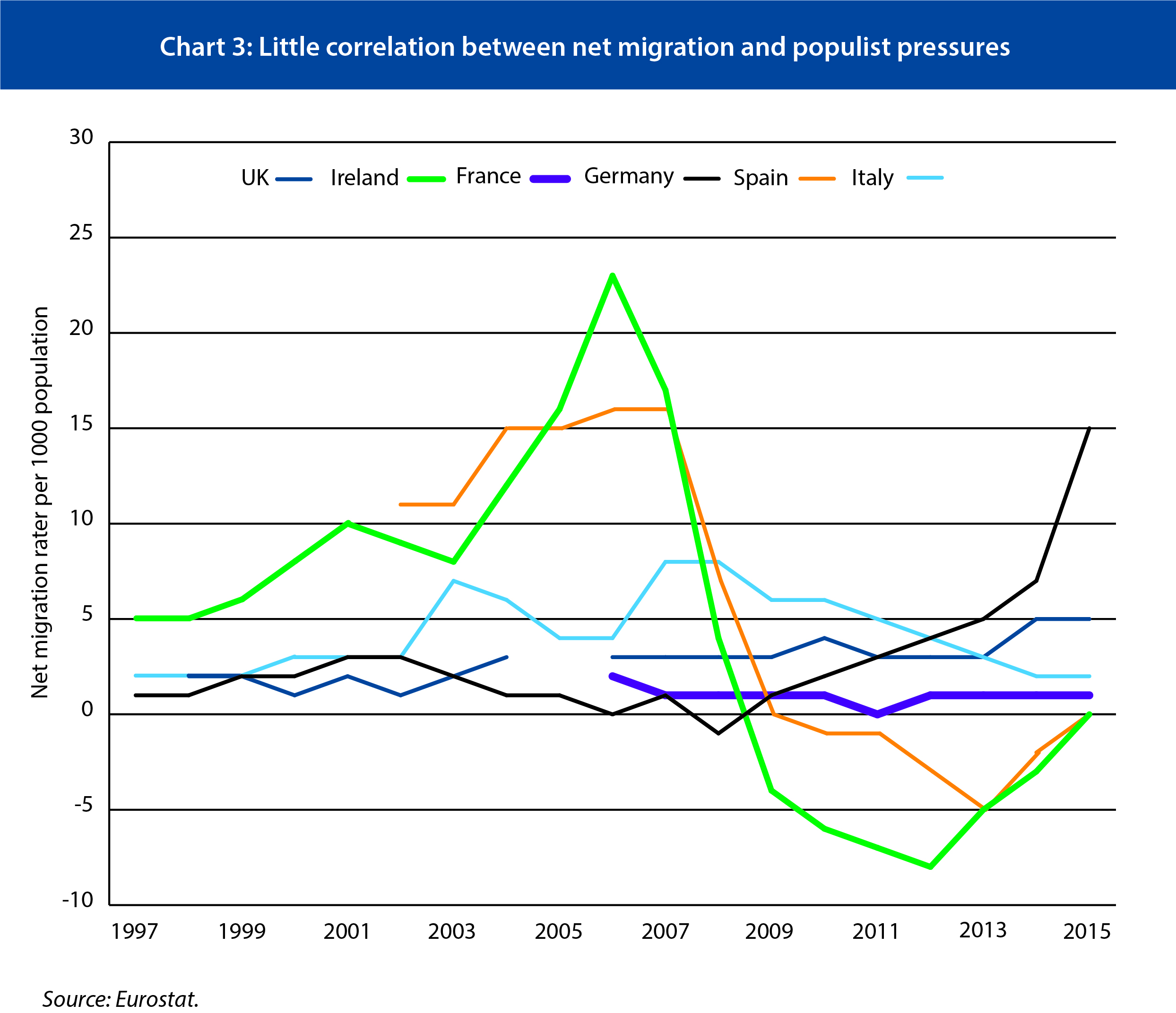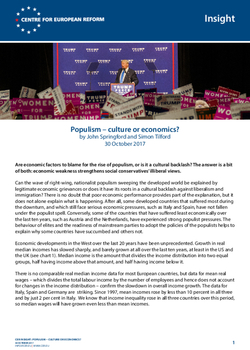
Populism – culture or economics?
Are economic factors to blame for the rise of populism, or is it a cultural backlash? The answer is a bit of both: economic weakness strengthens social conservatives' illiberal views.
Can the wave of right-wing, nationalist populism sweeping the developed world be explained by legitimate economic grievances or does it have its roots in a cultural backlash against liberalism and immigration? There is no doubt that poor economic performance provides part of the explanation, but it does not alone explain what is happening. After all, some developed countries that suffered most during the downturn, and which still face serious economic pressures, such as Italy and Spain, have not fallen under the populist spell. Conversely, some of the countries that have suffered least economically over the last ten years, such as Austria and the Netherlands, have experienced strong populist pressures. The behaviour of elites and the readiness of mainstream parties to adopt the policies of the populists helps to explain why some countries have succumbed and others not.
Economic developments in the West over the last 20 years have been unprecedented. Growth in real median incomes has slowed sharply, and barely grown at all over the last ten years, at least in the US and the UK (see chart 1). Median income is the amount that divides the income distribution into two equal groups, half having income above that amount, and half having income below it.

There is no comparable real median income data for most European countries, but data for mean real wages – which divides the total labour income by the number of employees and hence does not account for changes in the income distribution – confirm the slowdown in overall income growth. The data for Italy, Spain and Germany are striking. Since 1997, mean incomes rose by less than 10 percent in all three and by just 2 per cent in Italy. We know that income inequality rose in all three countries over this period, so median wages will have grown even less than mean incomes.

The reason for the worsening trend in median incomes is two-fold. First, economic growth has been very disappointing; a big slowdown relative to the previous 20-year period. Second, in many countries income inequality has grown, with higher income groups benefitting disproportionately from what economic growth there has been. In the case of the US, UK and Ireland, income inequality has remained at very high levels. All income groups have seen little in the way of income growth in these three countries since 2008. But the wealthy can cope with stagnant incomes – for poorer people, it is far more challenging.
Some countries that have struggled most economically have not fallen under the populist spell. Why?
Why has all this happened? Poor macroeconomic policies have impeded growth, especially since the financial crisis. Austerity is the wrong response to a slump brought on by a financial crisis, after which monetary policy struggles to stimulate the economy. Governments ignored the lesson of the 1930s, pursuing policies that had little basis in economic theory or historical experience. The globalisation of trade has made many products cheaper, but together with labour market reforms which have undermined the bargaining power of labour, increasing openness to trade has accelerated the loss of full-time secure employment for those with low and medium skills in developed economies. Many of those displaced workers have not been ‘freed’ to do more productive, knowledge-based work, as many hoped, but have ended up in unskilled, insecure, service-sector jobs.
Communities that have seen industries shrink or disappear have not bounced back. The costs have been long-term and pernicious, and help explain the growing popular rejection of free trade. It is perhaps unsurprising that support for Brexit and Trump was strong in such communities in the UK and in the US. Too many people have lost confidence in the future; they do not believe that things will get better.
Another reason is distribution. Governments have cited competition brought on by globalisation as a reason to cut taxes on business and capital, while increasing them on consumption and labour. This approach, combined with an unprecedented bail-out of the financial sector following the financial crisis, has undermined popular faith in market capitalism and the elites that benefit most from it. The people who helped precipitate the crisis, who were among the highest paid, were bailed out, while the costs of the clearing up the crisis were borne by society as a whole, especially the poorest, who did nothing to cause the crisis.
However, while poor economic performance is clearly a cause of the rise in support for parties on the extremes, it is a necessary but not sufficient condition for the ascent of nationalist populism. The academic debate about the causes of populism has become polarised, with some insisting that economic performance is to blame and others claiming that cultural factors are responsible. But political phenomena always have multiple causes, and the evidence shows that the economy has blown wind into the sails of pre-existing nationalist and anti-immigrant political movements.
Support for hard right parties tends to be higher after financial crises, as opposed to ‘normal’ recessions that are not preceded by a financial crash. And Europeans who live in economically struggling regions are less likely to trust national parliaments and the European Parliament. But support for right-wing populist parties – or Brexit – is most prevalent among people who are older, less educated and more socially conservative. Income is not so strong an indicator of support for radical parties: rich, elderly, poorly educated and socially conservative people are almost as likely to support the radical right as poor ones.
The latest research shows that economic slumps amplify the pre-existing tendency, among people who are already socially conservative and strongly opposed to immigration, to distrust establishment politicians and vote for more radical candidates. Poor economic performance tends to strengthen social conservatives’ distrust of parliaments, while liberal people are more likely to trust democratic institutions irrespective of economic conditions. And, after recessions, countries in which people tend not to trust other citizens are more politically unstable: governments in Nordic countries, where people are more likely to say they trust one another, tend to stay in office after recessions, while those in Italy and the UK, where societies are less trusting, tend to fall.
The link between trust and economic performance might partly explain why the US and the UK, where trust in politicians and the political process is low, succumbed to populism in 2016, while some other countries have weathered the storm. But it does not explain why populists in Spain, France and Italy, where popular frustration with political elites and corruption is high, have not won elections or referendums. One reason is electoral systems: France’s two-round presidential vote meant that the centre-right, centre-left and hard left voters rallied around Emmanuel Macron rather than handing power to Marine Le Pen (although she won far more support than her father Jean-Marie did in 2002, when the Front National last took part in a presidential run-off). Italy is in the process of reforming its electoral system so that it favours coalitions and larger parties, which will make it harder for the Five Star Movement to form a government.
Countries’ histories and political cultures are also important. Spain has struggled with much higher unemployment than Britain since the financial crisis, and had a much higher rate of immigration until 2008 (see chart 3). But populism in Spain is either a left-wing phenomenon (Podemos) or a regionalist one (Catalan and Basque separatist parties), because memories of Francisco Franco’s fascist regime are still fresh. Germany’s Alternative für Deutschland did better than expected in the 2017 federal elections, but the huge spike in the country’s net migration rate after it accepted hundreds of thousands of refugees in 2015 and 2016 did not result in a political earthquake as it would have done in many other countries. Ireland has a similar income distribution and economic structure to the UK, but its politicians did not exploit its very high rate of immigration in the run-up to the financial crisis for political advantage.

What does all this tell us about what moderate politicians should do to confront populism? First, they should stop pandering to anti-immigrant sentiment. In almost no continental European countries have centrist parties become hostile to free movement in the manner of Britain’s Conservatives and Labour. Instead, most centrist European politicians outside the UK have been cautious not to allow the EU’s founding principles to become part of legitimate political debate. France’s moderate politicians, despite the country’s relative scepticism about free trade, have not conducted a raucous debate about limits on the free movement of goods and services within the EU, for example. For their part, continental politicians should not seek political advantage by echoing popular hostility to migrants from outside the EU. Cheap air travel, Europe’s demographics, and rising incomes in poorer countries outside Europe (emigration is greatest from middle-income countries, not the poorest ones) mean that higher rates of immigration are here to stay. European politicians must find ways of demonstrating control while making the case for immigration; otherwise they risk ceding power to hard-right governments.
Britain’s rate of immigration has not been high in a European context, so why has it fallen prey to populism?
Second, Europe’s centre-right politicians need to understand that weak growth since 2008 has been a driver of political instability, and that hawkish fiscal and monetary policy has been one reason why the recovery took so long to arrive. Monetary policy needs to remain expansionary, in order to boost inflation and provide central banks with room to loosen monetary policy come the next downturn. Governments should also reverse the falls in public investment that have taken place since the financial crisis. Such spending would help to bolster the recovery and help raise the growth potential of economies. There is no evidence that this would lead to a loss of investor confidence in government finances.
Third, new thinking is needed on how to raise wages in the bottom half of the income distribution; and how to provide people with more opportunity. Reducing the tax burden on poor people should be the first priority; the UK’s tax credit system, which has successfully targeted redistribution at poorer families (and has been needlessly cut by recent governments) is a model to follow. Slowly raising minimum wages faster than inflation – and pausing rises if there is evidence that they are raising unemployment - would also help to raise incomes. And governments could use their balance sheets more ingeniously to provide funding for education and training: governments could pass on their low borrowing costs to older workers, providing them with low interest-rate loans to help them improve their skills.
Economics alone do not explain the rise of populism and growing rejection of liberalism in developed economies. The stagnation of median real incomes in the UK and US no doubt partly explain the election of a populist President and Britain’s vote to quit the EU. But other countries, such as France, Italy and Spain, have experienced very little growth in median incomes without populist thinking gaining ascendency. Similarly, median workers in the Netherlands, Denmark and Austria have done well over the last 20 years, including since the financial crisis, and yet these countries are home to some of the strongest populist pressures in Europe. Culture also matters: in particular the levels of social conservatism, attitudes to immigration, and history. And crucially, mainstream politicians have been too willing to confer legitimacy on populists by adopting their language and policies.
John Springford is director of research and Simon Tilford is deputy director of the Centre for European Reform.


Comments
Polish Liberalism was addicted to (i) Crony Capitalism (mainly Western-owned) and (ii) rewarding Communist criminals.
then ...
But I doubt anyone would believe that Anne Applebaum (Mrs R. Sikorski, ex FM) and Zanny Minton Beddoes (ed. of the Economist and fmr economics expert in transition Poland) are "our" last 2 reps at Bilderberg.
Incidentally, since the populists were voted in, the Polish economy has rocketed - esp. among those state-owned commercial companies primed for bankruptcy and privatization by the Liberals.
Last word for the Liberal Home Sec. Sienkiewicz: "The Polish state exists only theoretically" ... secret recording.
Add new comment